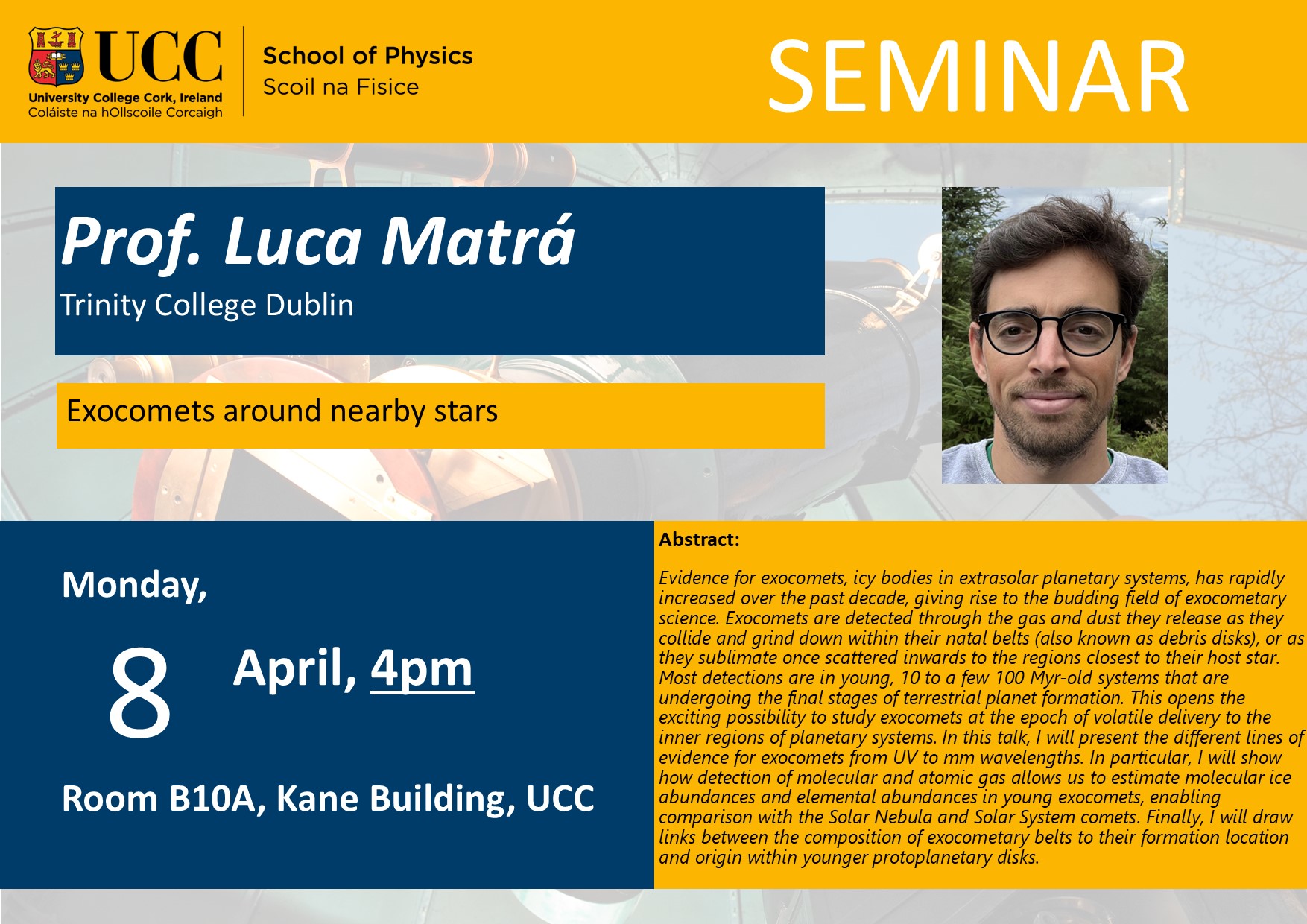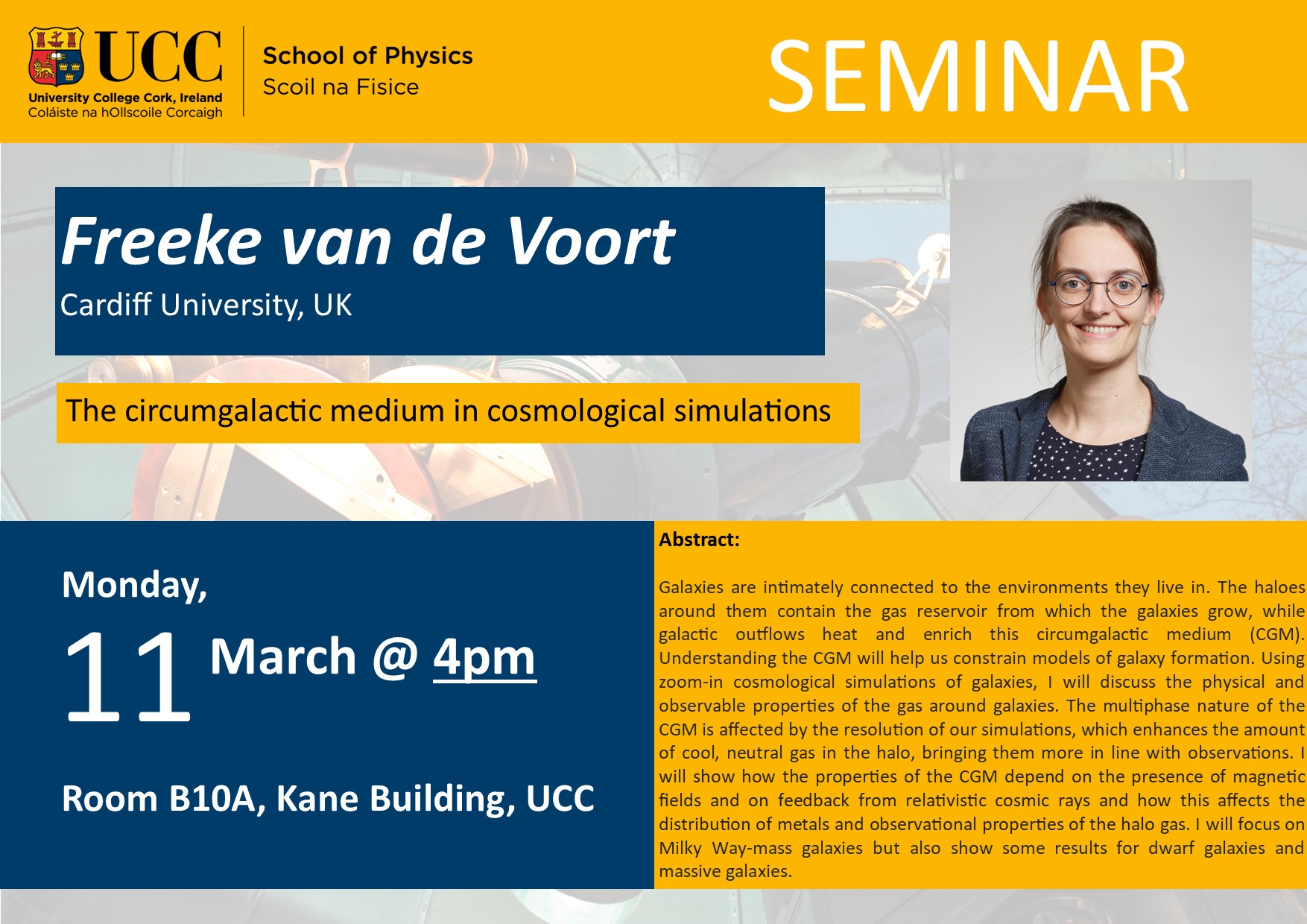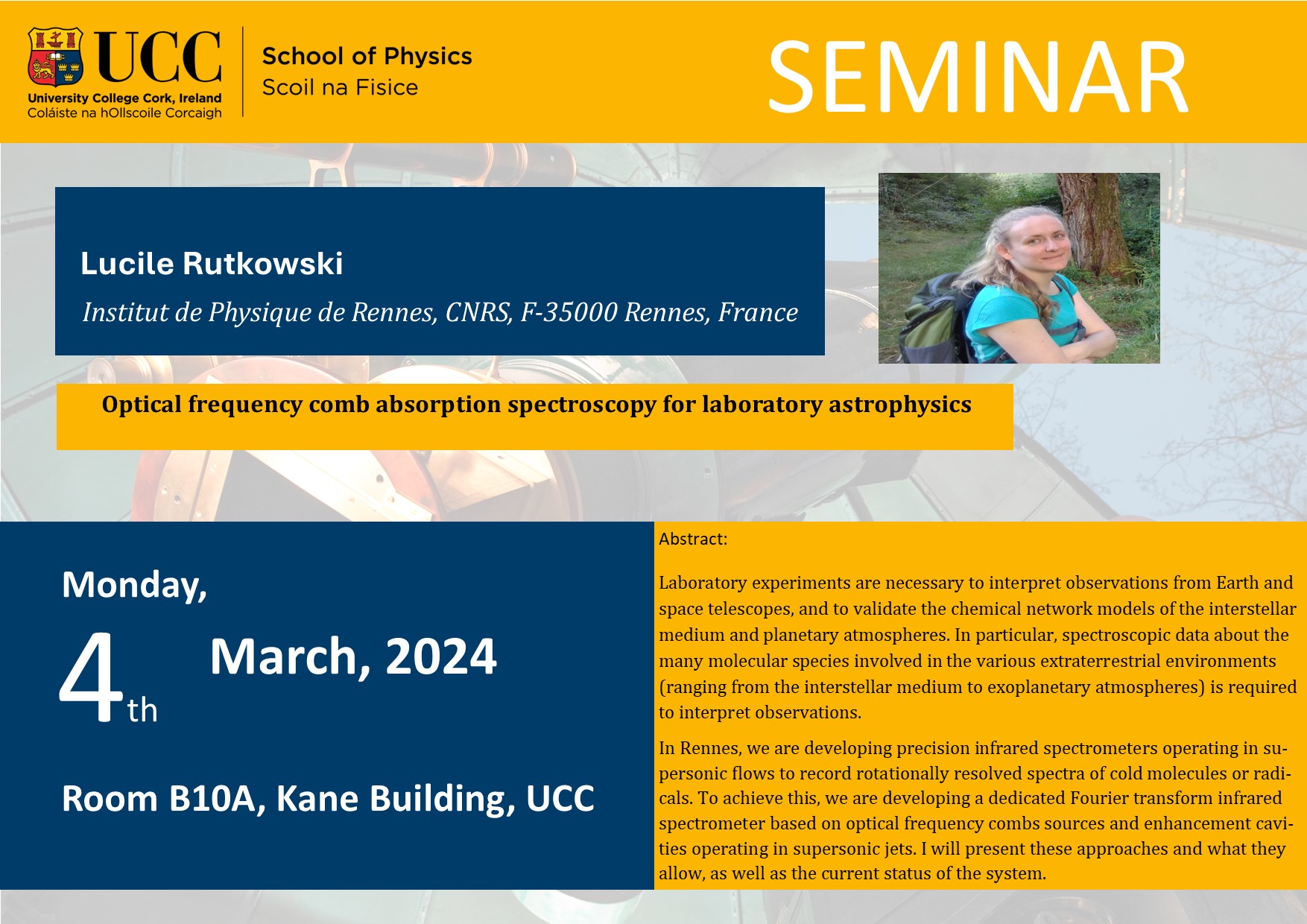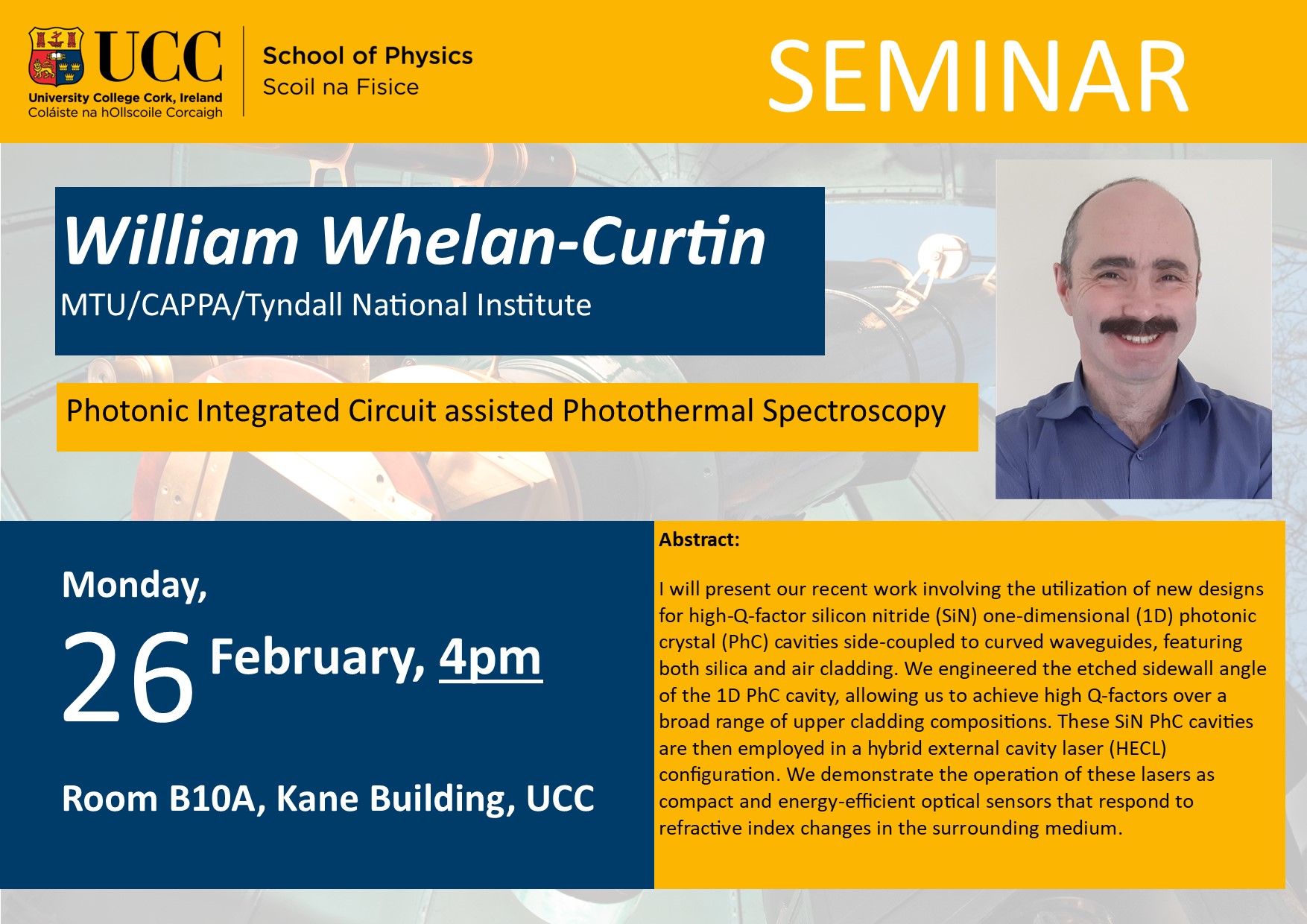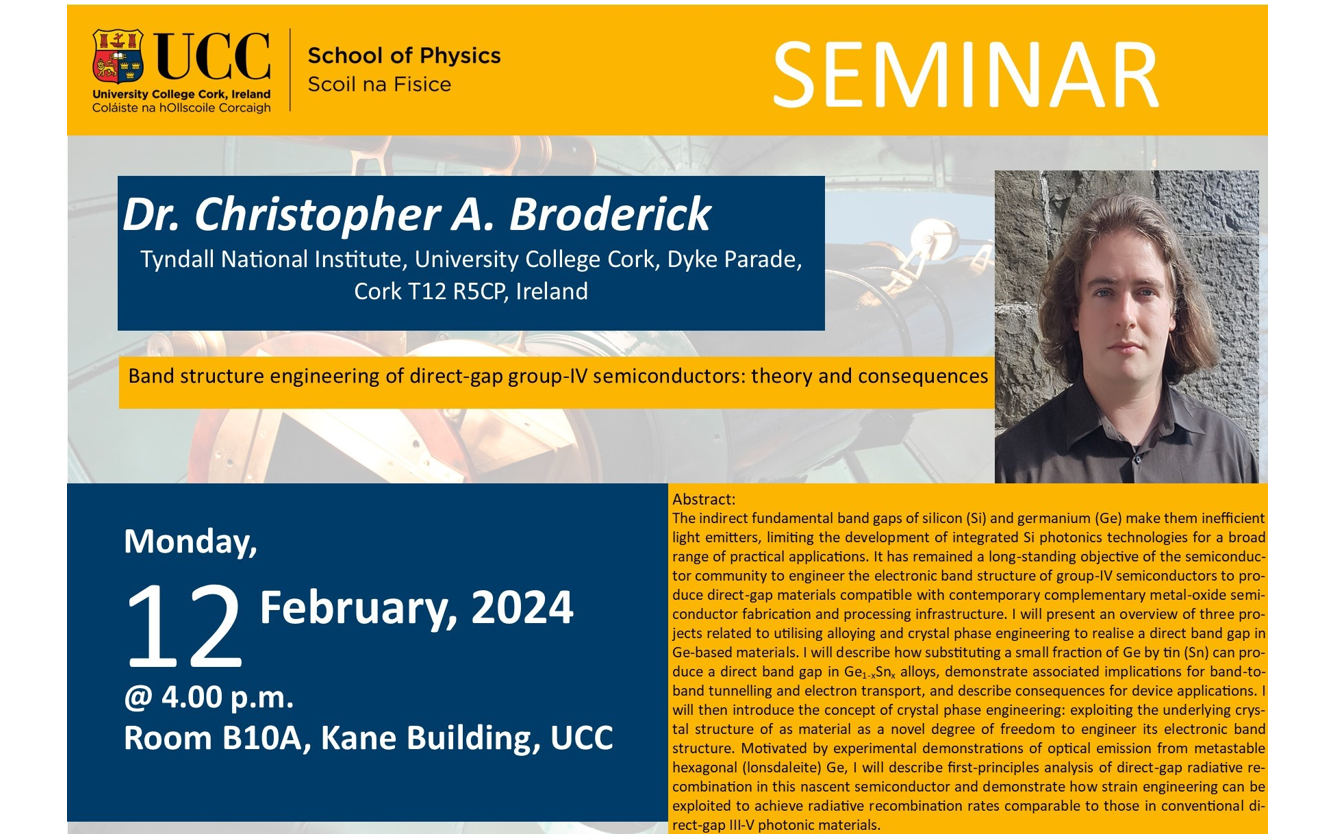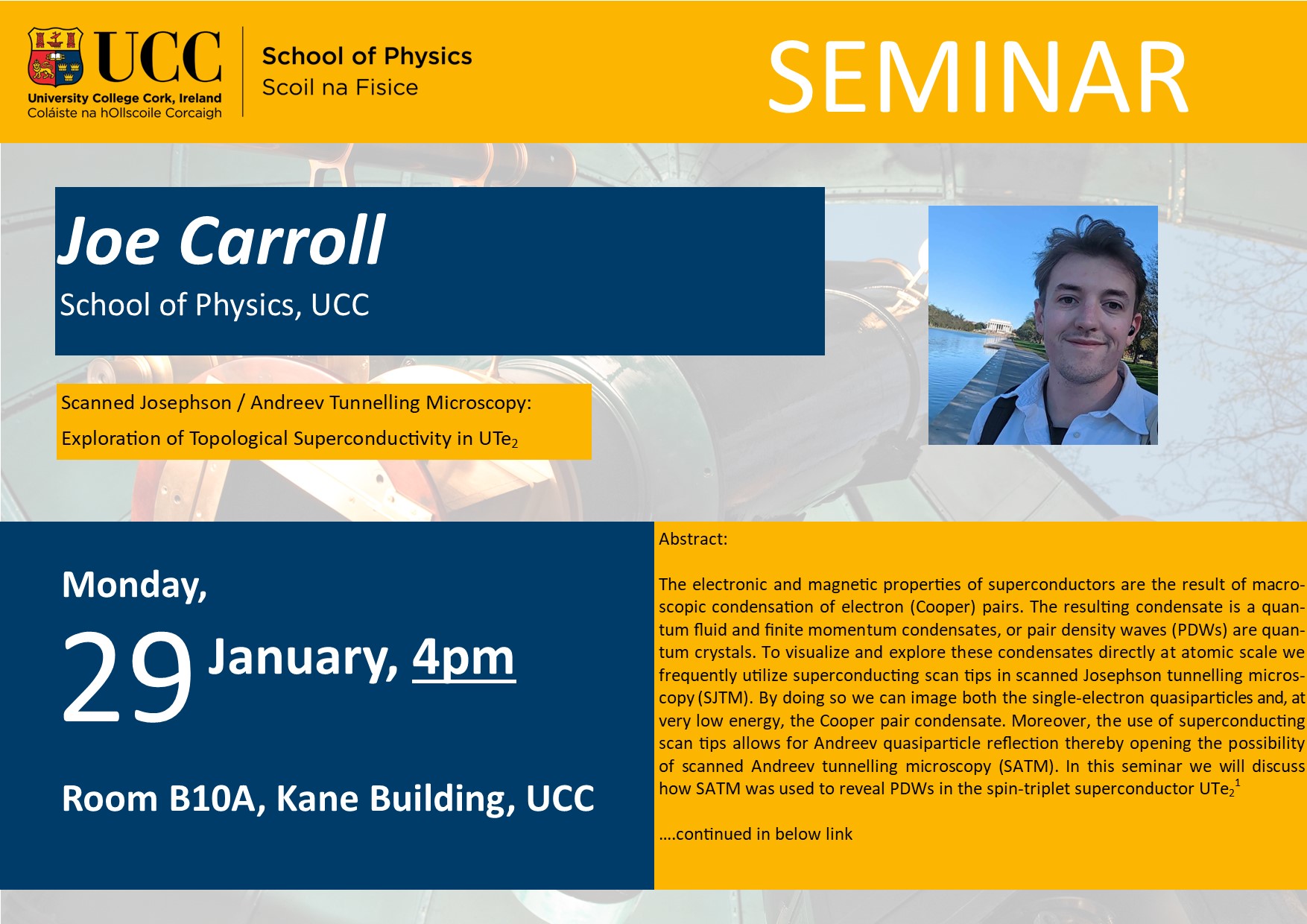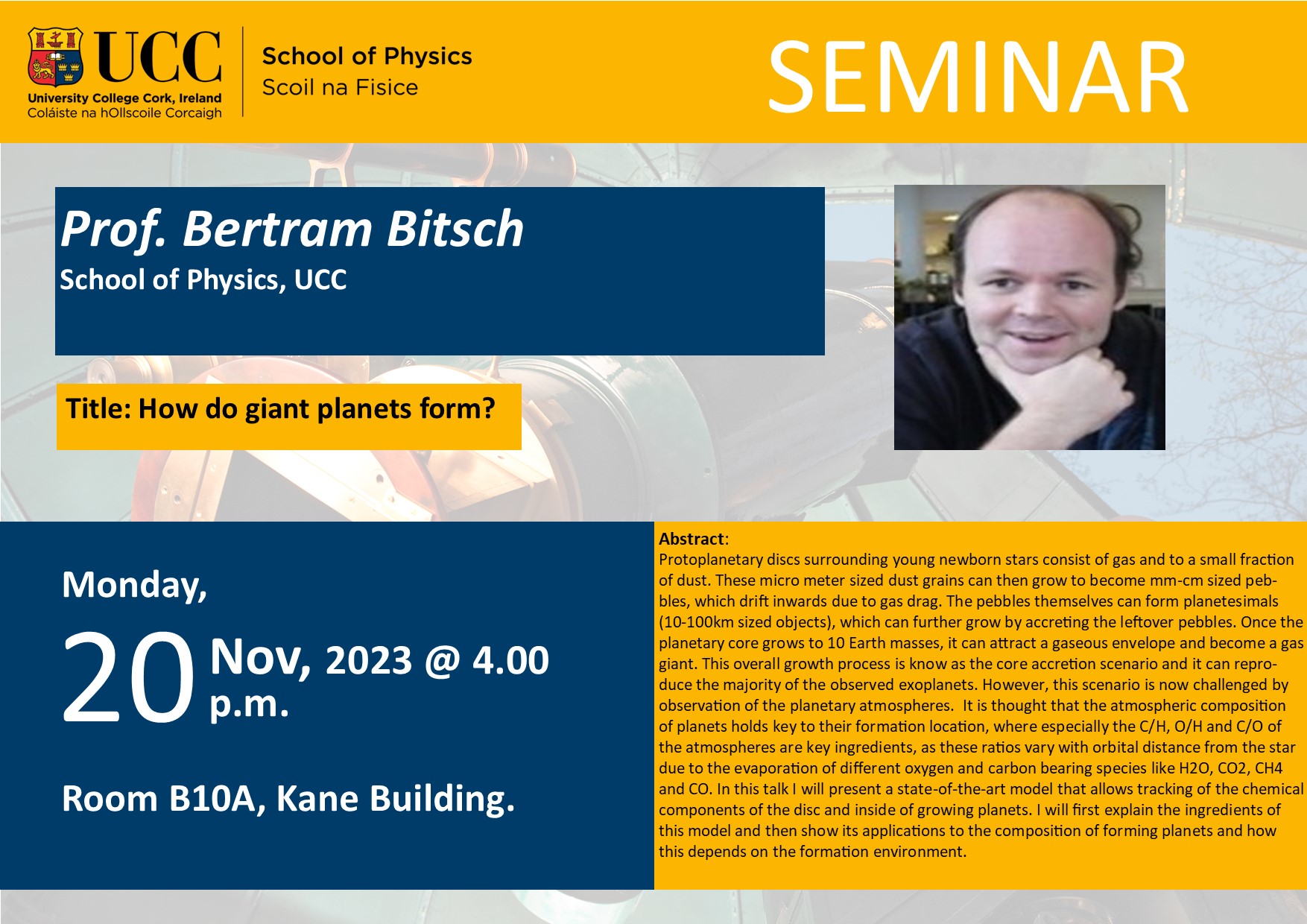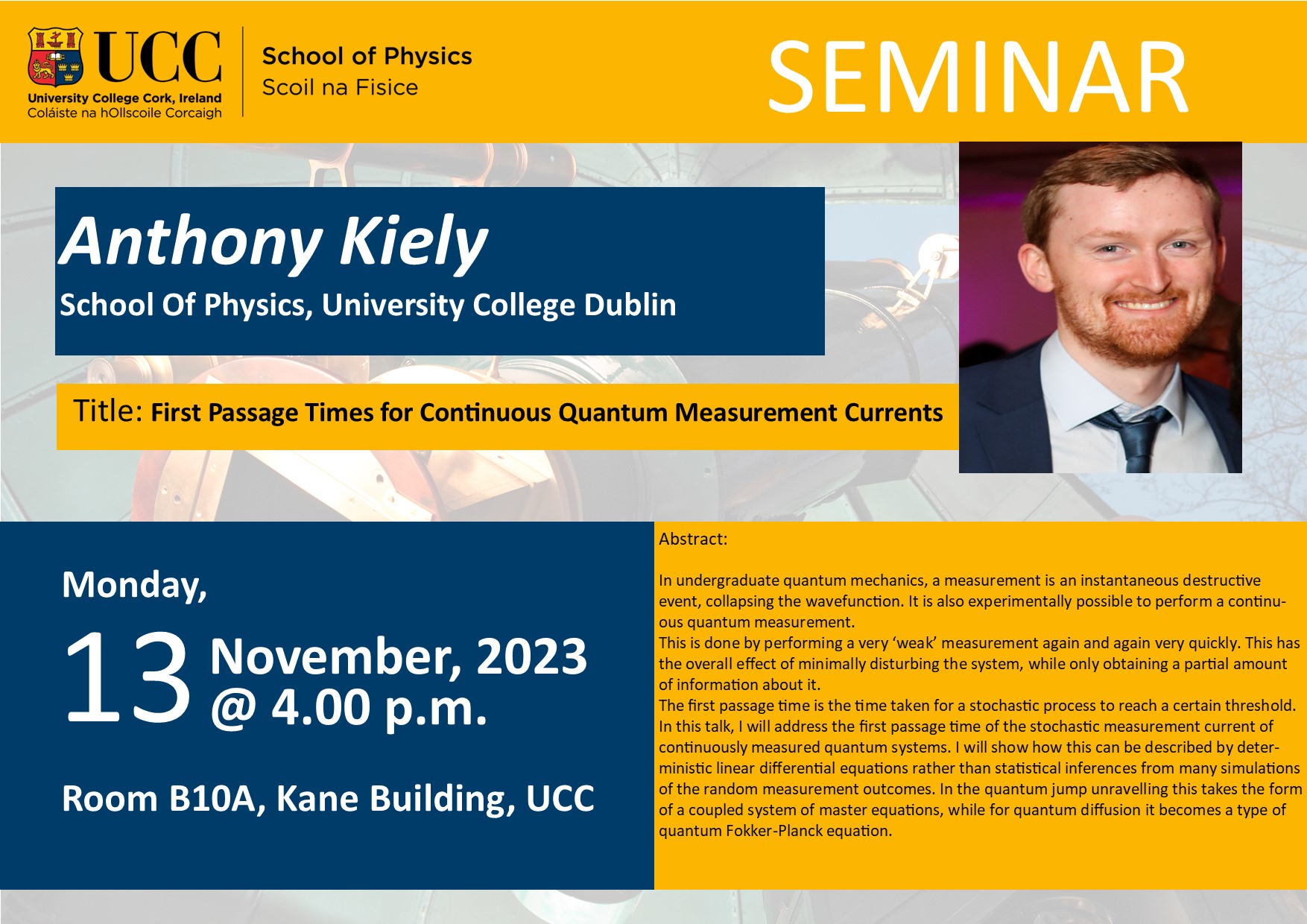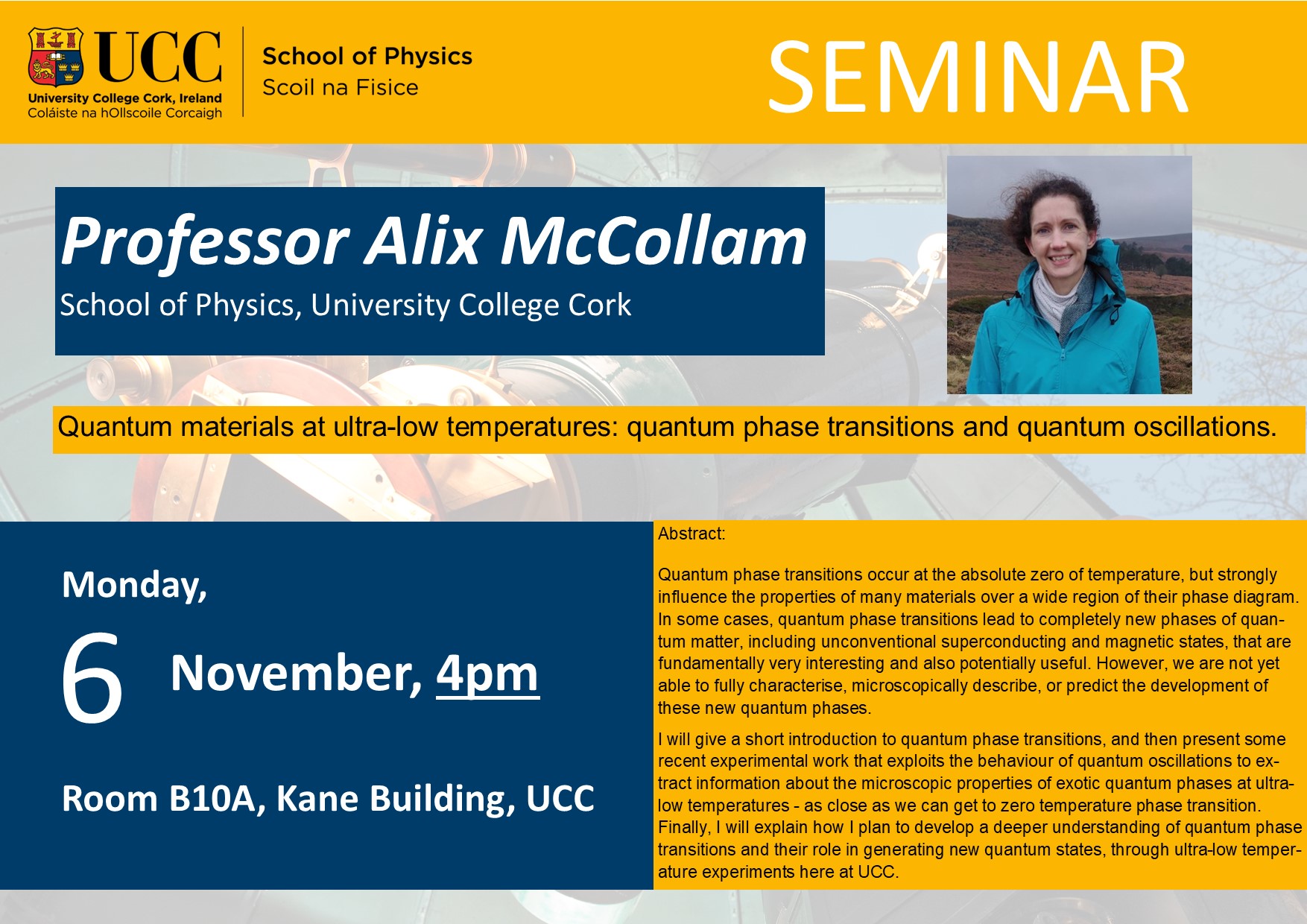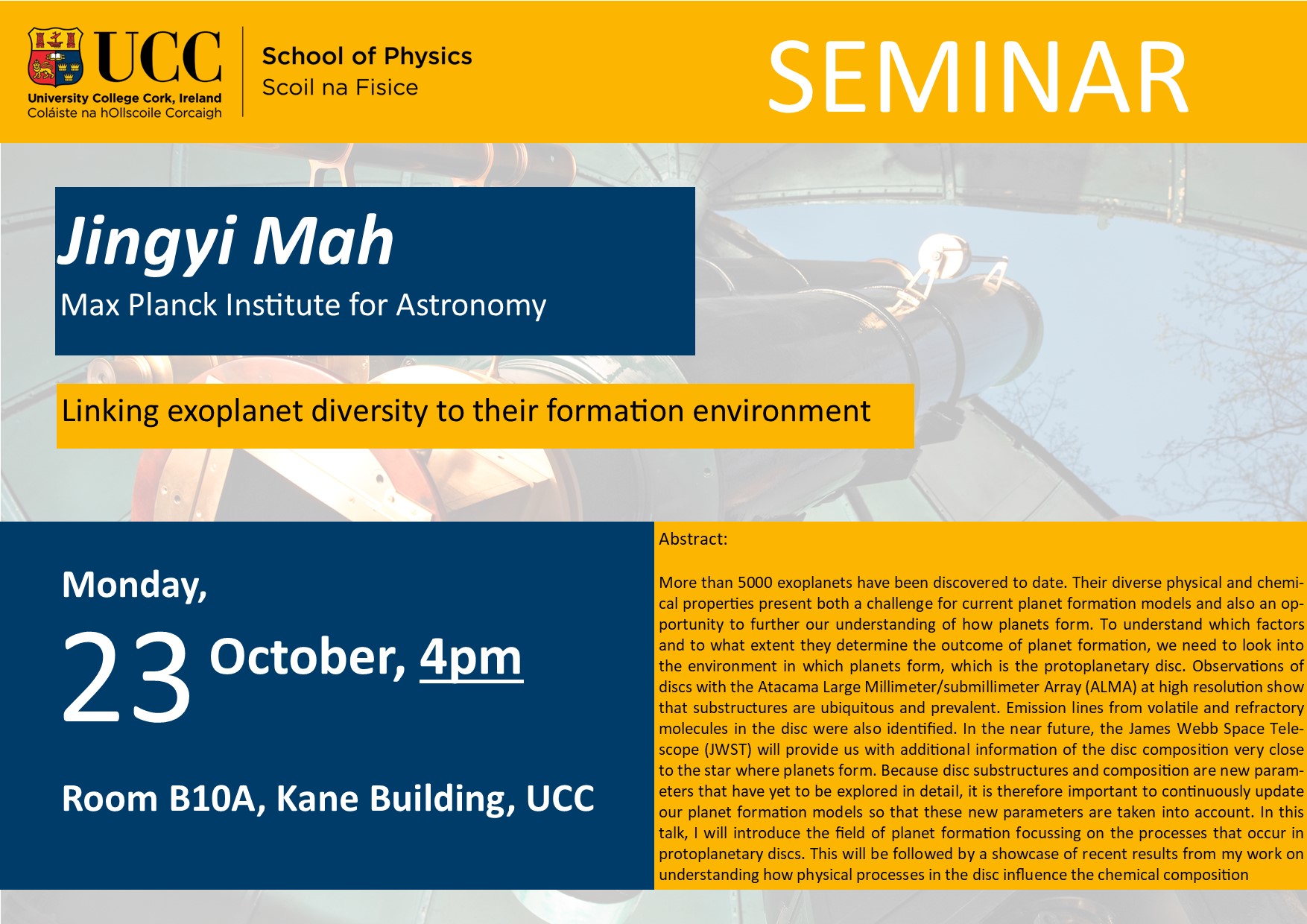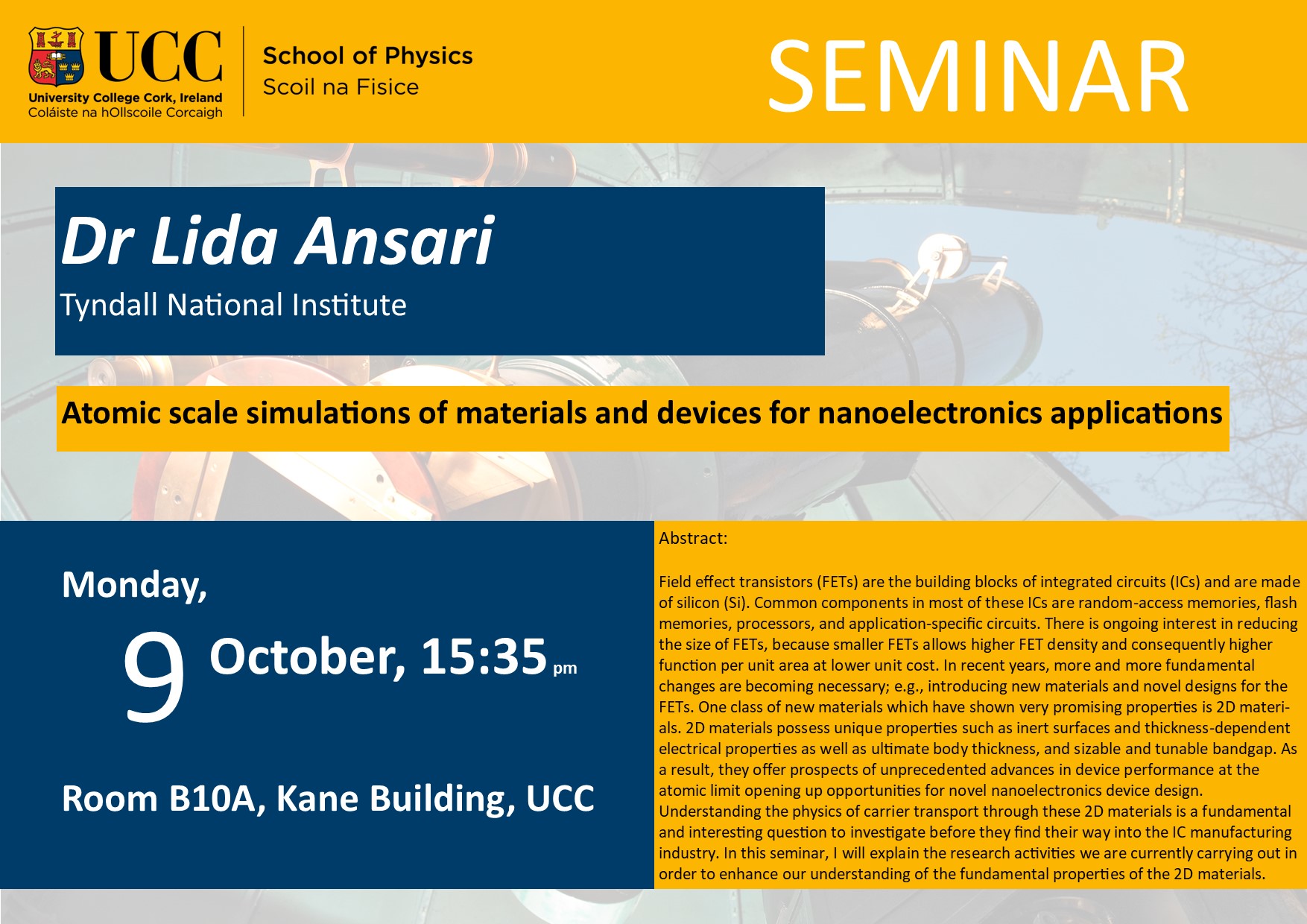In This Section
- Home
- Semester and Timetable Information
- Study Physics
- Our Research
- Our People
- Careers and Alumni
- Seminars, News and Events
- Outreach and School Resources
- About the School
- What is Physics
- The Crawford Observatory
- Frequently Asked Questions
- UCC Futures Quantum & Photonics
- Supports/EDI
Luca Matrá 8th April 2024
| Seminar Speaker |
Professor Luca Matrá, Trinity College Dublin |
| Venue |
B10A, Basement of Kane Science Building, UCC |
| Time |
4pm / Monday, 8th April, 2024 |
| Title |
Exocomets around nearby stars |
| Abstract |
Evidence for exocomets, icy bodies in extrasolar planetary systems, has rapidly increased over the past decade, giving rise to the budding field of exocometary science. Exocomets are detected through the gas and dust they release as they collide and grind down within their natal belts (also known as debris disks), or as they sublimate once scattered inwards to the regions closest to their host star. Most detections are in young, 10 to a few 100 Myr-old systems that are undergoing the final stages of terrestrial planet formation. This opens the exciting possibility to study exocomets at the epoch of volatile delivery to the inner regions of planetary systems. In this talk, I will present the different lines of evidence for exocomets from UV to mm wavelengths. In particular, I will show how detection of molecular and atomic gas allows us to estimate molecular ice abundances and elemental abundances in young exocomets, enabling comparison with the Solar Nebula and Solar System comets. Finally, I will draw links between the composition of exocometary belts to their formation location and origin within younger protoplanetary disks. |
Freeke van de Voort 11th March 2024
| Seminar Speaker |
Freeke van de Voort |
| Venue |
B10A, Basement of Kane Science Building, UCC |
| Time | 4pm / Monday, 11th March, 2024 |
| Title |
The circumgalactic medium in cosmological simulations |
| Abstract |
Galaxies are intimately connected to the environments they live in. The haloes around them contain the gas reservoir from which the galaxies grow, while galactic outflows heat and enrich this circumgalactic medium (CGM). Understanding the CGM will help us constrain models of galaxy formation. Using zoom-in cosmological simulations of galaxies, I will discuss the physical and observable properties of the gas around galaxies. The multiphase nature of the CGM is affected by the resolution of our simulations, which enhances the amount of cool, neutral gas in the halo, bringing them more in line with observations. I will show how the properties of the CGM depend on the presence of magnetic fields and on feedback from relativistic cosmic rays and how this affects the distribution of metals and observational properties of the halo gas. I will focus on Milky Way-mass galaxies but also show some results for dwarf galaxies and massive galaxies. |
Lucile Rutkowski 4th March 2024
| Seminar Speaker |
Lucile Rutkowski |
| Venue |
B10A, Basement of Kane Science Building, UCC |
| Time | 4pm / Monday, 4th February, 2024 |
| Title |
Optical frequency comb absorption spectroscopy for laboratory astrophysics |
| Abstract |
Laboratory experiments are necessary to interpret observations from Earth and space telescopes, and to validate the chemical network models of the interstellar medium and planetary atmospheres. In particular, spectroscopic data about the many molecular species involved in the various extraterrestrial environments (ranging from the interstellar medium to exoplanetary atmospheres) is required to interpret observations. In Rennes, we are developing precision infrared spectrometers operating in supersonic flows to record rotationally resolved spectra of cold molecules or radicals. To achieve this, we are developing a dedicated Fourier transform infrared spectrometer based on optical frequency combs sources and enhancement cavities operating in supersonic jets. I will present these approaches and what they allow, as well as the current status of the system. |
William Whelan-Curtin 26th February 2024
| Seminar Speaker |
William Whelan-Curtin (Liam O'Faolain) from MTU/CAPPA/Tyndall |
| Venue |
B10A, Basement of Kane Science Building, UCC |
| Time | 4pm / Monday, 26th February, 2024 |
| Title |
Photonic Integrated Circuit assisted Photothermal Spectroscopy |
| Abstract | I will present our recent work involving the utilization of new designs for high-Q-factor silicon nitride (SiN) one-dimensional (1D) photonic crystal (PhC) cavities side-coupled to curved waveguides, featuring both silica and air cladding. We engineered the etched sidewall angle of the 1D PhC cavity, allowing us to achieve high Q-factors over a broad range of upper cladding compositions. These SiN PhC cavities are then employed in a hybrid external cavity laser (HECL) configuration. We demonstrate the operation of these lasers as compact and energy-efficient optical sensors that respond to refractive index changes in the surrounding medium. |
Christopher Broderick 12th February 2024
| Seminar Speaker |
Dr. Christopher A. Broderick (Tyndall National Institute) |
| Venue |
B10A, Basement of Kane Science Building, UCC |
| Time | 4pm / Monday, 12th February, 2024 |
| Title |
Band structure engineering of direct-gap group-IV semiconductors: theory and consequences |
| Abstract | The indirect fundamental band gaps of silicon (Si) and germanium (Ge) make them inefficient light emitters, limiting the development of integrated Si photonics technologies for a broad range of practical applications. It has remained a long-standing objective of the semiconductor community to engineer the electronic band structure of group-IV semiconductors to produce direct-gap materials compatible with contemporary complementary metal-oxide semiconductor fabrication and processing infrastructure. I will present an overview of three projects related to utilising alloying and crystal phase engineering to realise a direct band gap in Ge-based materials. I will describe how substituting a small fraction of Ge by tin (Sn) can produce a direct band gap in Ge1-xSnx alloys, demonstrate associated implications for band-to-band tunnelling and electron transport, and describe consequences for device applications. I will then introduce the concept of crystal phase engineering: exploiting the underlying crystal structure of as material as a novel degree of freedom to engineer its electronic band structure. Motivated by experimental demonstrations of optical emission from metastable hexagonal (lonsdaleite) Ge, I will describe first-principles analysis of direct-gap radiative recombination in this nascent semiconductor and demonstrate how strain engineering can be exploited to achieve radiative recombination rates comparable to those in conventional direct-gap III-V photonic materials. |
Joe Carroll 29th January 2024
| Seminar Speaker |
Joe Carroll(School of Physics, UCC) |
| Venue |
B10A, Basement of Kane Science Building, UCC |
| Time | 4pm / Monday, 29th Janaury, 2023 |
| Title |
Scanned Josephson / Andreev Tunnelling Microscopy: Exploration of Topological Superconductivity in UTe2 |
| Abstract | The electronic and magnetic properties of superconductors are the result of macroscopic condensation of electron (Cooper) pairs. The resulting condensate is a quantum fluid and finite momentum condensates, or pair density waves (PDWs) are quantum crystals. To visualize and explore these condensates directly at atomic scale we frequently utilize superconducting scan tips in scanned Josephson tunnelling microscopy (SJTM). By doing so we can image both the single-electron quasiparticles and, at very low energy, the Cooper pair condensate. Moreover, the use of superconducting scan tips allows for Andreev quasiparticle reflection thereby opening the possibility of scanned Andreev tunnelling microscopy (SATM). In this seminar we will discuss how SATM was used to reveal PDWs in the spin-triplet superconductor UTe21. Despite the rich theoretical framework for topological spin triplet superconductors there have been few if any such materials discovered to date. Although there is strong evidence UTe2 is such a superconductor, its superconducting order-parameter has not yet been established. A distinctive identifier of such spin-triplet topological superconductors is the appearance of a topological surface band (TSB) on many or all crystal surfaces. We present theory calculations demonstrating that symmetry characteristics of the TSB are observable in tunnelling to an s-wave superconductor and may distinguish between chiral and non-chiral . Using SATM we discover large zero-energy Andreev conductance at the (0-11) crystal surface. Development of this zero-energy Andreev conductance peak into two finite-energy conductance maxima as the tunnel barrier is reduced, rules out a chiral pairing state. Overall, the TSB zero-energy Andreev conductance peak, its behaviour under increased tunnelling current, and signatures of internodal scattering in quasiparticle interference images are characteristic of a spin triplet topological superconductor of B3u symmetry.
[1]. Nature 618, 921–927 (2023)
|
Bertram Bitsch 20th November 2023
| Seminar Speaker |
Bertram Bitsch (School of Physics, UCC) |
| Venue |
B10A, Basement of Kane Science Building, UCC |
| Time | 4pm / Monday, 20th November, 2023 |
| Title |
How do giant planets form? |
| Abstract | Protoplanetary discs surrounding young newborn stars consist of gas and to a small fraction of dust. These micro meter sized dust grains can then grow to become mm-cm sized pebbles, which drift inwards due to gas drag. The pebbles themselves can form planetesimals (10-100km sized objects), which can further grow by accreting the leftover pebbles. Once the planetary core grows to 10 Earth masses, it can attract a gaseous envelope and become a gas giant. This overall growth process is know as the core accretion scenario and it can reproduce the majority of the observed exoplanets. However, this scenario is now challenged by observation of the planetary atmospheres. It is thought that the atmospheric composition of planets holds key to their formation location, where especially the C/H, O/H and C/O of the atmospheres are key ingredients, as these ratios vary with orbital distance from the star due to the evaporation of different oxygen and carbon bearing species like H2O, CO2, CH4 and CO. In this talk I will present a state-of-the-art model that allows tracking of the chemical components of the disc and inside of growing planets. I will first explain the ingredients of this model and then show its applications to the composition of forming planets and how this depends on the formation environment.
|
Anthony Kiely 13th Nov 2023
| Seminar Speaker |
Anthony Kiely, School of Physics, University College Dublin |
| Venue | B10A, Basement of Kane Science Building, UCC |
| Time | 4pm / Monday, 13th November, 2023 |
| Title |
First Passage Times for Continuous Quantum Measurement Currents |
| Abstract | In undergraduate quantum mechanics, a measurement is an instantaneous destructive event, collapsing the wavefunction. It is also experimentally possible to perform a continuous quantum measurement. This is done by performing a very ‘weak’ measurement again and again very quickly. This has the overall effect of minimally disturbing the system, while only obtaining a partial amount of information about it. The first passage time is the time taken for a stochastic process to reach a certain threshold. In this talk, I will address the first passage time of the stochastic measurement current of continuously measured quantum systems. I will show how this can be described by deterministic linear differential equations rather than statistical inferences from many simulations of the random measurement outcomes. In the quantum jump unravelling this takes the form of a coupled system of master equations, while for quantum diffusion it becomes a type of quantum Fokker-Planck equation. |
Alix McCollam Nov 6th 2023
| Seminar Speaker |
Professor Alix McCollam, School of Physics, UCC |
| Venue | B10A, Basement of Kane Science Building, UCC |
| Time | 4pm / Monday, 6th November, 2023 |
| Title |
Quantum materials at ultra-low temperatures: |
| Abstract | Quantum phase transitions occur at the absolute zero of temperature, but strongly influence the properties of many materials over a wide region of their phase diagram. In some cases, quantum phase transitions lead to completely new phases of quantum matter, including unconventional superconducting and magnetic states, that are fundamentally very interesting and also potentially useful. However, we are not yet able to fully characterise, microscopically describe, or predict the development of these new quantum phases. I will give a short introduction to quantum phase transitions, and then present some recent experimental work that exploits the behaviour of quantum oscillations to extract information about the microscopic properties of exotic quantum phases at ultra-low temperatures - as close as we can get to zero temperature phase transition. |
Jingyi Mah 23rd October 2023
| Seminar Speaker |
Jingyi Mah, Max Planck Institute for Astronomy |
| Venue | B10A, Basement of Kane Science Building, UCC |
| Time | 4pm / Monday, 23rd October, 2023 |
| Title |
Linking exoplanet diversity to their formation environment |
| Abstract | More than 5000 exoplanets have been discovered to date. Their diverse physical and chemical properties present both a challenge for current planet formation models and also an opportunity to further our understanding of how planets form. To understand which factors and to what extent they determine the outcome of planet formation, we need to look into the environment in which planets form, which is the protoplanetary disc. Observations of discs with the Atacama Large Millimeter/submillimeter Array (ALMA) at high resolution show that substructures are ubiquitous and prevalent. Emission lines from volatile and refractory molecules in the disc were also identified. In the near future, the James Webb Space Telescope (JWST) will provide us with additional information of the disc composition very close to the star where planets form. Because disc substructures and composition are new parameters that have yet to be explored in detail, it is therefore important to continuously update our planet formation models so that these new parameters are taken into account. In this talk, I will introduce the field of planet formation focussing on the processes that occur in protoplanetary discs. This will be followed by a showcase of recent results from my work on understanding how physical processes in the disc influence the chemical composition. |
Lida Ansari 9th October 2023
| Seminar Speaker |
Dr. Lida Ansari, Tyndall National Institute |
| Venue | B10A, Basement of Kane Science Building, UCC |
| Time | 3.35pm / Monday, 9th October, 2023 |
| Title |
Atomic scale simulations of materials and devices for nanoelectronics applications |
| Abstract | Field effect transistors (FETs) are the building blocks of integrated circuits (ICs) and are made of silicon (Si). Common components in most of these ICs are random-access memories, flash memories, processors, and application-specific circuits. There is ongoing interest in reducing the size of FETs, because smaller FETs allows higher FET density and consequently higher function per unit area at lower unit cost. In recent years, more and more fundamental changes are becoming necessary; e.g., introducing new materials and novel designs for the FETs. One class of new materials which have shown very promising properties is 2D materials. 2D materials possess unique properties such as inert surfaces and thickness-dependent electrical properties as well as ultimate body thickness, and sizable and tunable bandgap. As a result, they offer prospects of unprecedented advances in device performance at the atomic limit opening up opportunities for novel nanoelectronics device design. Understanding the physics of carrier transport through these 2D materials is a fundamental and interesting question to investigate before they find their way into the IC manufacturing industry. In this seminar, I will explain the research activities we are currently carrying out in order to enhance our understanding of the fundamental properties of the 2D materials. |
School of Physics
Scoil na Fisice
Contact us
Room 213 (Physics Office), 2nd floor, Kane Science Building, University College Cork, Ireland.,

